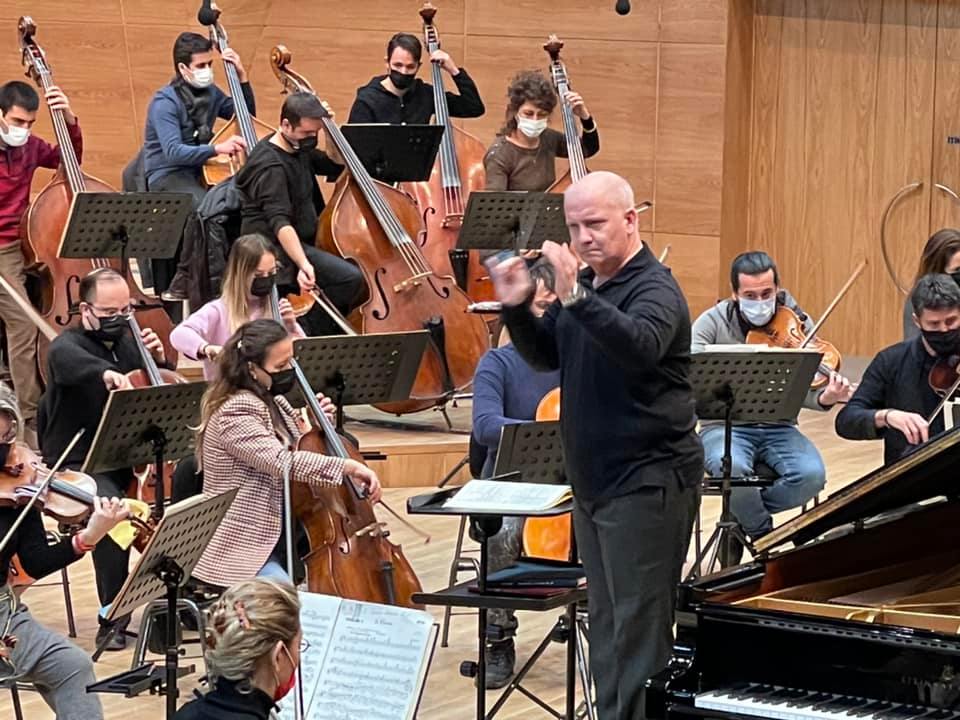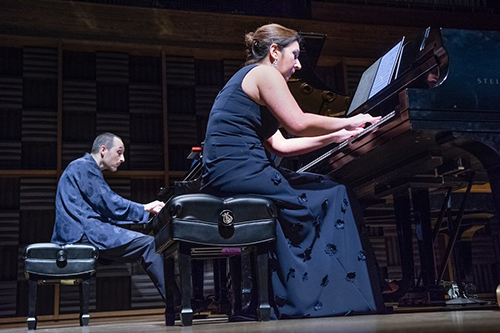by Daniel Hathaway

The orchestra will be led by Theodore Kuchar and Carl Topilow. Kuchar, a violist and 1982 graduate of the Cleveland Institute of Music, became the Principal Guest Conductor of the Ukrainian State Symphony Orchestra in 1992, and was appointed Artistic Director and Principal Conductor of the ensemble in 1994, when it changed its name to the National Symphony Orchestra of Ukraine. In 2000, he became Conductor Laureate for Life.
The National Symphony, based in Lviv, is currently on an extended 40-concert tour aimed at promoting Ukrainian culture that included a stop at Carnegie Hall (read the New York Times article here). Its first-ever concert in Cleveland, which will feature duo-pianists Emanuela Friscioni and Antonio Pompa-Baldi, marks the one-year anniversary of the Russian invasion of Ukraine — almost down to the minute.
In a Zoom conversation earlier this week, Kuchar said he had met for coffee with the American Ambassador to Ukraine last February in Lviv following a performance of the Dvořák Requiem. “I went home late on the 23rd and at about 4:20 the next morning, I heard sounds I had never heard before.” Those turned out to be World War II-era Soviet sirens screaming from atop telephone poles, announcing the Russian invasion.
“I live on the top floor of a very nice, old building in the center of Lviv. And boy, you should have heard those rickety old steps as people were moving to bomb shelters like cattle being taken to the slaughterhouse. It was just nonstop,” Kuchar said. “I didn’t get out of bed. I lay there listening to all of this thinking that if I have the luck of being one of 700,000 people in this city to be targeted, it was meant to happen. I didn’t leave.”

One of the many mysteries surrounding everyday life in Ukraine is how societal and cultural events have continued to take place even while bombs are being dropped, missiles fired, and people are being displaced. During this period, the National Orchestra of Ukraine continued planning for a tour of the United States, which was launched in January of this year.
In the same Zoom conversation, Tri-C’s Emanuela Friscioni said that she and her husband, Antonio Pompa-Baldi, who had worked with Kuchar in the past, had been in contact about a performance here. “That has to happen in Cleveland, because we have one of the largest Ukrainian populations in the U.S., and besides that, Cleveland loves classical music in all its forms.” But the 40 cities on the itinerary had one glaring omission.

Frantic telephone calls revealed that all the major halls in town had already been booked, “so we went back to thinking of how everything started,” Kuchar said. “My mom taught at Tri-C West, and at the age of 19, I put together an orchestra there that I named the Cleveland Sinfonia. WCLV and the Plain Dealer were very supportive, and it gave me the opportunity to develop my managerial skills.”
That could only have happened in Cleveland, Kuchar said. “If I was studying in New York or London, I would have been like a cockroach on the floor among many other cockroaches. Nobody realizes how priceless a Cleveland music education can be.
“I can tell you different ways to sneak into Severance Hall so you can hear the greatest orchestra in the world for free,” Kuchar said. “You have wonderful museums, we were a stop for the Guarneri Quartet several times a year, and there’s so much other music that is happening at such a high level on a daily basis. There’s no place like Cleveland to be exposed to so many different forms of culture, but to have such easy access to it — that’s the most important thing. If you want it to be part of your life, it’s waiting there to be taken. It all started for me at Tri-C about 35 years ago, and I’ve now moved to the Metro Campus. I finally made it downtown.”
Emanuela Friscioni had high praise for everyone invoiced in the joint venture of bringing the Orchestra to Cleveland. “Commemorating the first anniversary of the invasion has deep meaning for all of us. And in addition to the concert, there will be an art exhibit in the lobby by a Tri-C student who is from Lviv featuring portraits of Ukrainians who have lost family members, as well as a traveling exhibit of art being made in bomb shelters.”
On Thursday, February 23 at 7:00 pm, Tri-C Classical Piano Series presents the Lviv Philharmonic Orchestra of Ukraine, Theodore Kuchar & Carl Topilow, conducting, with Emanuela Friscioni & Antonio Pompa-Baldi, duo-pianists. Brahms’ Tragic Overture, Yevhen Stankovych’s Chamber Symphony No. 3, Mozart’s Concerto No. 10 in E-flat for two pianos & Dvořák’s Symphony No. 9, “From the New World.” Cuyahoga Community College Metro Auditorium, E. 30th & Woodland, Cleveland. Tickets can be purchased online.
Published on ClevelandClassical.com February 22, 2023.
Click here for a printable copy of this article



